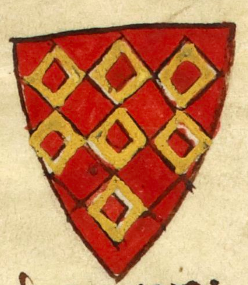English usually refers to:

In some cultures, a surname, family name, or last name is the portion of one's personal name that indicates their family, tribe or community.
Sir Charles Harding Firth was a British historian. He was one of the founders of the Historical Association in 1906.

The House of Glücksburg, shortened from House of Schleswig-Holstein-Sonderburg-Glücksburg, is a Dano-German branch of the House of Oldenburg, members of which have reigned at various times in Denmark, Norway, Greece and several northern German states.
Richard Fitzalan, 1st Earl of Arundel was an English nobleman and soldier.

Saer de Quincy, 1st Earl of Winchester was one of the leaders of the baronial rebellion against John, King of England, and a major figure in both the kingdoms of Scotland and England in the decades around the turn of the twelfth and thirteenth centuries.

Conrad Malte-Brun, born Malthe Conrad Bruun, and sometimes referred to simply as Malte-Brun, was a Dano-French geographer and journalist. His second son, Victor Adolphe Malte-Brun, was also a geographer. Today he is perhaps best remembered for coining the name for the geographic region Oceania around 1812.

Thomas Frederick Tout was a British historian of the medieval period. He was one of the founders of the Historical Association in 1906.

Chouan is a French nickname. It was used as a nom de guerre by the Chouan brothers, most notably Jean Cottereau, better known as Jean Chouan, who led a major revolt in Bas-Maine against the French Revolution. Participants in this revolt–and to some extent French anti-Revolutionary activists in general–came to be known as Chouans, and the revolt itself came to be known as the Chouannerie.
The birth name is the name of the person given upon their birth. The term may be applied to the surname, the given name or to the entire name. Where births are required to be officially registered, the entire name entered onto a births register or birth certificate may by that fact alone become the person's legal name. The assumption in the Western world is often that the name from birth will persist to adulthood in the normal course of affairs—either throughout life or until marriage. Some possible changes concern middle names, diminutive forms, changes relating to parental status, and changes related to gender transition. Matters are very different in some cultures in which a birth name is for childhood only, rather than for life.
Goff is a surname with several distinct origins, mainly Germanic, Celtic, Jewish, and French. It is the 946th most common family name in the United States. When the surname originates from England it is derived from an occupational name from German, Cornish and Breton. The German Goff means a godly person, a strong warrior, or a priest. The Breton goff means "smith". The English-originating surname is common in East Anglia, where it is of Breton origin. The Welsh name is a variant of the surname Gough, and is derived from a nickname for someone with red hair. The native Irish name is derived from a patronymic form of the Gaelic personal name Eochaidh/Eachaidh, which means "horseman".
John Henry Blunt was an English divine.
Sir Frederick Maurice Powicke (1879–1963) was an English medieval historian. He was a Fellow of Merton College, Oxford, a professor at Belfast and Manchester, and from 1928 until his retirement Regius Professor at Oxford. He was made a Knight Bachelor in 1946.

Peter Courtenay was Bishop of Exeter (1478-87) and Bishop of Winchester (1487-92), and also had a successful political career during the tumultuous years of the Wars of the Roses.
Sir John Goronwy Edwards was a Welsh historian.
Edmund, 2nd Earl of Kent was a member of the English royal family.
Trump is a surname of English and German origin:
Sir Philip de Willoughby, was lieutenant of the Treasurer, Baron of the Exchequer of England, Chancellor of the Exchequer between 1283-1305 and was the keeper of the wardrobe to The Lord Edward between 1269-1274 and Dean of Lincoln between 1288 and 1305.
Sir Alan Buxhull K.G. was an English soldier and nobleman.
This page is based on this
Wikipedia article Text is available under the
CC BY-SA 4.0 license; additional terms may apply.
Images, videos and audio are available under their respective licenses.






